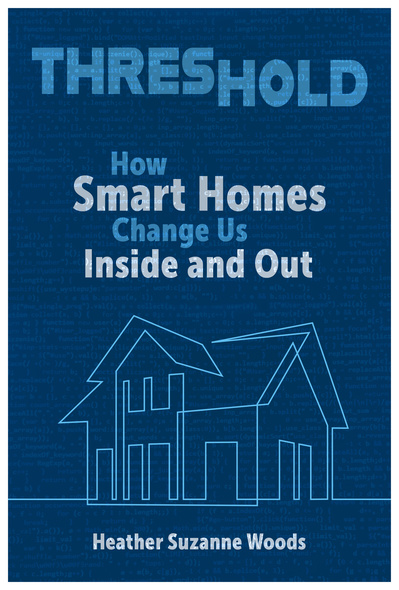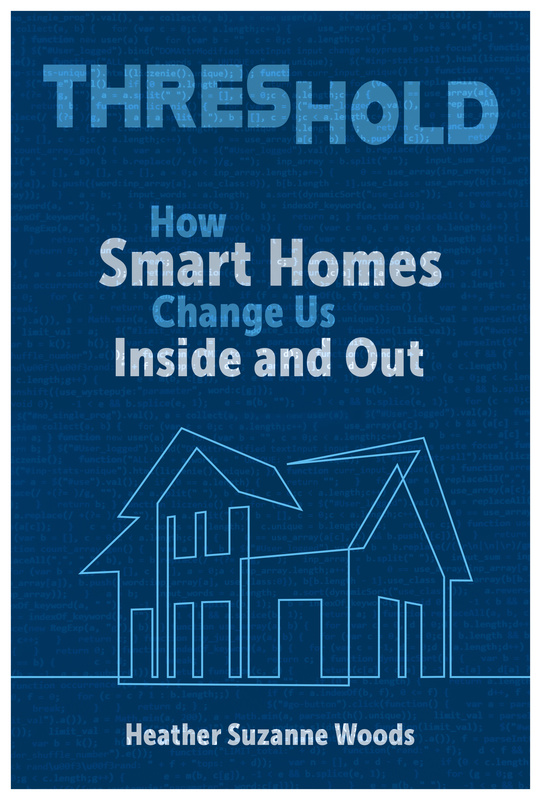
226 pages, 6 x 9
5
Paperback
Release Date:15 May 2024
ISBN:9780817361433
Hardcover
Release Date:15 May 2024
ISBN:9780817321949
Threshold
How Smart Homes Change Us Inside and Out
SERIES:
Rhetoric and Digitality
University of Alabama Press
An urgent and cautionary examination of the totalizing effect of smart home technology on the lives of those who live in them—and those who don’t
Smart homes are here—domestic spaces bristling with networked technologies that appear to enhance work, entertainment, logistics, health, and security. But these technologies may also extract a cost in attention, money, and privacy. In Threshold, communication and technology expert Heather Suzanne Woods applies rhetorical theory to answer the urgent question of how swiftly proliferating smart homes alter those who inhabit them.
Building on extensive research into smart homes in the United States, Woods recounts how smart homes arose and predicts the trajectory of their future form. She pulls back the curtain on the technology, probes who is in control, and questions whether a home can be too smart. She reveals how smart homes incentivize ubiquitous computing as a daily practice, priming smart home occupants for permanent transactional existence largely controlled by corporate interests.
Woods suggests a dynamic cultural framework for understanding smart homes that takes into account sociotechnical variables such as gender, class, income, race, criminal justice, and more through which smart homes shape human life. Woods’s framework reveals how smart homes both reflect social norms about technology as well as whet consumer appetites for an ever more totalizing relationship with technology. She argues that this progression leads to “living in digitality,” a cultural state of constant use and reliance on technology.
Written for homeowners, policymakers, technology enthusiasts, and scholars, Threshold interweaves meticulously researched critical analysis with matter-of-fact graphics that map relationships between digital tools and social life. Readers will appreciate this bracing assessment of smart technologies that empowers smart home users to make informed decisions about their dwellings.
Smart homes are here—domestic spaces bristling with networked technologies that appear to enhance work, entertainment, logistics, health, and security. But these technologies may also extract a cost in attention, money, and privacy. In Threshold, communication and technology expert Heather Suzanne Woods applies rhetorical theory to answer the urgent question of how swiftly proliferating smart homes alter those who inhabit them.
Building on extensive research into smart homes in the United States, Woods recounts how smart homes arose and predicts the trajectory of their future form. She pulls back the curtain on the technology, probes who is in control, and questions whether a home can be too smart. She reveals how smart homes incentivize ubiquitous computing as a daily practice, priming smart home occupants for permanent transactional existence largely controlled by corporate interests.
Woods suggests a dynamic cultural framework for understanding smart homes that takes into account sociotechnical variables such as gender, class, income, race, criminal justice, and more through which smart homes shape human life. Woods’s framework reveals how smart homes both reflect social norms about technology as well as whet consumer appetites for an ever more totalizing relationship with technology. She argues that this progression leads to “living in digitality,” a cultural state of constant use and reliance on technology.
Written for homeowners, policymakers, technology enthusiasts, and scholars, Threshold interweaves meticulously researched critical analysis with matter-of-fact graphics that map relationships between digital tools and social life. Readers will appreciate this bracing assessment of smart technologies that empowers smart home users to make informed decisions about their dwellings.
Threshold: How Smart Homes Change Us Inside and Out is compelling, well written, and engaged with a problem of significance to scholars of rhetoric. Dr. Woods’s analysis of smart homes is timely, insightful, and sure to provide a useful toolkit for future analysis.’
—Nathan R. Johnson, author of Architects of Memory: Information and Rhetoric in a Networked Archival Age
Threshold: How Smart Homes Change Us Inside and Out is exceptionally timely and likely to be a reference point for at least a decade. The social and cultural impacts of COVID-19 on remote work, domestic life, and suburban flight will be the focus of intense interest. Threshold is unique in the way it weaves shared themes around the ‘smart home’ as a place that is shaping society in both private and public ways.’
—Faber McAlister, former editor of Women’s Studies in Communication
Heather Suzanne Woods is associate professor of media and communication at Kansas State University. She is coauthor of Make America Meme Again: The Rhetoric of the Alt-Right. Her peer-reviewed scholarship has appeared in Cultural Studies, Critical Studies in Media Communication, and Feminist Media Studies.




